
Teachers can search their database for lesson ideas and art history assignments.
- Subject:
- Arts Education
- Visual Arts
- Material Type:
- Lesson
- Author:
- the art of education university
- Date Added:
- 05/19/2022

This is a collection of high quality resources that can be used throughout the month of June and beyond.

Teachers can search their database for lesson ideas and art history assignments.

Instructions on using the Class Entry feature on Dossier.

A video tutorial and list of steps for interpreting RAD Data using Dossier.

This site houses a large collection of videos, arranged by subject, that have been individually reviewed by K-12 teachers.
There are also quizzes, games and puzzles as well as a presentation creator that helps users of all ages create presentations right on the site.
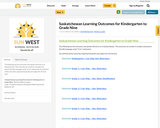
The following are the outcomes each grade will work on in Saskatchewan. The outcomes are written in student and parent friendly language using "I Can" statements.
You will find all the outcomes organized by grade and subject for the full year.
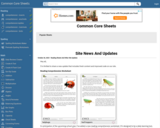
This site uses American standards, so filter by SKILL, not grade to find what you need.
This site allows you to differentiate for a wide variety of needs quickly!
Create activities for PAPER or ONLINE learning. This can be used in the classroom and for distance learning.
*daily review creator!
*create mixed or spiral reviews to foster mastery
*create practice pages to reinforce skills
*print cheat sheets to explain skills to students
*create flashcards for review
*create modified versions of activities
*create quizzes
*multiple languages available
*drills
*make your own spelling lists using word families or use pre-made lists
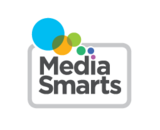
MediaSmarts has designed a new educational card game for grades 9 to 12, #ForYou: A Game About Algorithms, to simulate the different roles that recommendation algorithms play in delivering videos and ads online. The card game is accompanied by a lesson plan (for classroom use) and a discussion guide (for use in a home, workshop or community group). For more details, please visit the MediaSmarts website.Contact: Julia Ladouceur, Project Manager at MediaSmarts, jladouceur@mediasmarts.ca

This site offers open-and-go lessons that inspire kids to love science!
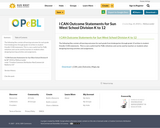
The following files contain all learning outcomes for each grade from kindergarten through grade 12 written in student-friendly I CAN statements, as well as outcomes.
This is a very useful tool for PeBL initiatives and can be used by teachers or students when designing learning activities and assignments.
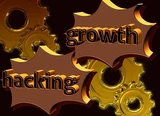
This PAA survey course was developed by Gary Vrinten at the DLC and is targetted towards grade 10 students. This course was developed for delivery in a face-to-face format.Modules in this course include vehicle maintenance, tool use, home maintenance, food and nutrition, basic first aid, and much more. Understanding personal wellness and financial implications of our decisions is heavily integrated throughout this course. This course encourages and provides ample opportunity for the inclusion of expertise from within the community supplementing teacher knowledge and expertise.

This collection houses resources that support teachers in implementing research and evidence-based practices in the instruction of reading. This collection is being added to and developed and is a "work in progress!" Please continue to check back as we add more resources and links!

Storytelling/Story Acting (STSA) is a simple movement based on the work of Vivian Paley. STSA involves children dictating stories to adults, followed by a teacher-facilitated acting out of children’s stories at meeting times throughout the day. STSA develops narrative fluency, the concept of a story, and the opportunity to express emotions and experiences. There is no need for rehearsal or special props and stories can be acted out anywhere. It is however, important to designate a “stage” and develop a routine around STSA.

Supporting Student Assessment in Saskatchewan:provides research-based effective practices for classroom assessment;outlines philosophical ideas and guiding principles for assessment in Saskatchewan classrooms; and,reflects the spirit of continuous improvement.Supporting Student Assessment in Saskatchewan is a resource intended to support teachers and school division leaders, replacing the document Student Evaluation: A Teacher Handbook (1991).

A systematic approach to teaching writing in Grades 1-3 and Grades 4-9.Includes: Curriculum at a glanceRequired productsIdentified skills requiredConnection to brain pockets (memory, fact, imagination)Assessment optionsA toolbox of strategies & resources
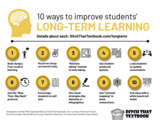
What can students do to make learning really stick?
Cognitive science tells us it's NOT to re-read our notes or textbook.
Instead, practice "retrieval" -- recalling what we've learned out of our brains, not our books.
This post outlines 10 simple tips and strategies you can use in class to make learning long-term, including:
1. Brain dumps
2. Two things
3. Retrieve taking (instead of note taking)
4. Student-produced quizzes
5. Guided conversation
6. Now, then, and way back
7. Self testing
8. Recall information visually
9. Retrieval mapping
10. White board exit ticket